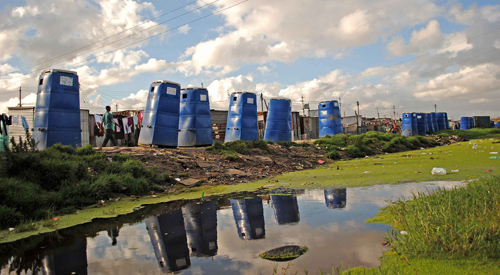
REUTERS/Siphiwe Sibeko
South Africa urgently needs new policy ideas to reverse the alarming increase in poverty among its population. New figures reveal an increase of three million South Africans living in poverty over the last five years. More than half (55%) of the population lives on less than R1,138 (USD$107) a month, up from 53% in 2011.
In a country with 55 million people, 34 million are going without some of the basic necessities, like housing, transport, food, heating and proper clothing. The escalation in hardship and vulnerability reverses the steady progress made since the 1990s.
The poorest have been hit the hardest. One in four citizens survives on less than R531 a month and can’t afford to buy enough food to keep healthy. This proportion has risen from one in five in 2011.
The consequences are plain to see. They include more street begging, homelessness, loan sharks, social discontent, substance misuse and violent crime in many communities. Income is not the only measure of poverty. Progress on education, health and basic living conditions also seems to have stalled.
Progress setback
The decline in living standards has occurred despite the extension of social grants to two million more recipients in the past five years, bringing the total number of social grant beneficiaries to 17 million. That is nearly one in three people.
Over the previous decade and a half, extending social grants proved to be an effective way of alleviating hardship. Something has changed.
The global economic slowdown and depressed commodity prices have obviously contributed to the problem. These factors have raised unemployment to record high levels. Domestic political uncertainties, regulatory conflicts and weaknesses in public administration have also dented business confidence and undermined private sector investment.
New ideas are needed to combat poverty and inequality in South Africa. A good place to start is the concept of inclusive growth. This is partly about ensuring more people play an active part in economic, social and political processes. It gives people agency and dignity, and helps to hold institutions to account.
The limits of redistribution
Since the 1990s, the government’s approach to poverty has focused on fiscal redistribution. Tax rates increase the more people earn, and the revenue raised has been used to support poorer groups. Social assistance has taken the form of free housing, free education, health care, sanitation, electricity and social grants.
Spending on this “social wage” has more than doubled in real terms (taking inflation into account) over the past decade. It now amounts to 60% of total public spending. South Africa is reputed to have one of the most redistributive fiscal policies (tax and spending) in the world.
Yet, with a sluggish economy, high government debt and new demands for bailouts from state owned enterprises and universities, the ability to pay for this welfare system is severely strained. It will be extremely difficult to raise the value of social support or extend it to more people in the period ahead.
Since South Africa progressed from apartheid to democracy in 1994, there has been an understandable focus on distributional matters. These efforts have taken priority over action to promote broad-based growth, integrated development and overall prosperity.
Too little attention has gone into expanding production, employment creation (outside the public sector) and enlarging the resource base. Among households, too, there has been excessive emphasis on spending, rather than saving and investing in education, skills and household assets. As a result, the economy and society are poorly equipped to cope with shocks.
Inclusive growth
“Inclusive growth” is often touted as a way forward. It’s an umbrella concept to get people with different interests to work together and build a new consensus around a shared agenda for the country’s development. But what does it mean in practice?
A central element is creating new and different kinds of economic opportunities and linking them explicitly to social needs. Major investments in technology, infrastructure and other facilities should lower barriers to inclusion and give more people on low incomes a chance to work or develop skills to progress.
Growth can’t be left to market forces and private enterprise. And social development can’t be left to government alone. A more integrated “whole of society” approach is needed to bridge historical divides.
This means business, labour, civil society and different spheres of government all playing a role in combating poverty by going beyond their conventional responsibilities. Organisations should take positive steps to continually open up opportunities and reduce social inequalities. Firms should actively seek out new markets, new suppliers and new sources of labour.
Local development
Recent discussions have been limited to national stakeholders. Equivalent local initiatives have been few and far between. Yet a strong and prosperous society cannot be engineered from above.
South Africa needs to build competent institutions at local level too. Common platforms for collaboration are required to harness the energies and share the know-how of people in the cities, towns and villages where they live, work and invest.
A place-based approach means tailoring inclusionary economic policies to local realities and opportunities. Local investments in housing, transport, business property and skills will have a greater impact when they are carefully linked and coordinated.
Support informality
Current ambivalent attitudes towards informality are not helping anyone. The informal economy could be a nursery for people to learn valuable skills, a stepping stone to formal jobs, and a seedbed for larger, more competitive businesses.
Many unemployed and destitute adults can’t get the grants available to pensioners, children and the disabled. Yet various forms of bureaucratic red tape obstruct their initiatives to start informal enterprises and “create their own jobs”.
Informal settlements are a route for people to escape rural poverty and gain access to urban job markets. Yet they are neglected, hazardous places threatened by government evictions. Affordable urban housing could instead be a driver of inclusive growth and spatial transformation.
Ivan Turok, Executive Director, HSRC, Human Sciences Research Council
This article was originally published on The Conversation.



